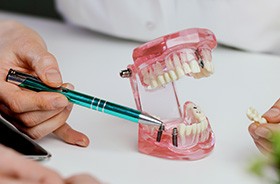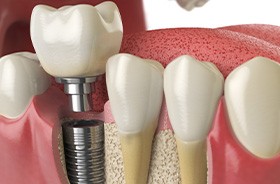Dental Implants — Lebanon, NH
Replace Missing Teeth for Life
The loss of natural teeth can hurt much more than a person’s oral health — they may struggle to eat food properly, speak clearly, or even feel confident in everyday settings. At Santavicca Dental Professionals, we want to help our patients regain not only their complete smile, but also their wellbeing and quality of life, too. Dental implants in Lebanon are unmatched in terms of longevity, aesthetic value, and durability. To explore this revolutionary method for rebuilding teeth, keep reading below or contact us today to schedule a consultation.
Why Choose Santavicca Dental Professionals For Dental Implants?
- Replace Any Number of Missing Teeth for Life
- Start-to-Finish Dental Implant Treatment
- Advanced Dental Implant Procedures & Technology
What Are Dental Implants?

Dental implants are the only tooth replacement designed to replace missing teeth both above and below the gumline. Traditional options such as dentures and dental bridges only replace the crowns of missing teeth. Dental implants replace both the crowns and roots of missing teeth for a replacement that truly mimics nature.
A dental implant is a small titanium post that can be inserted into the jawbone. There, it will fuse with the bone tissue to create a strong foundation for the replacement tooth or teeth. A small connector piece on top of the implant called an abutment will secure a custom-made restoration to the implant, seamlessly rebuilding your smile good as new.
The 4 Step Dental Implant Process

The process of getting dental implants involves multiple steps and may take several months from start to finish. Many dental practices must refer patients to an outside specialist for parts of their implant journey. At Santavicca Dental Professionals, however, we are often able to perform comprehensive dental implant care, from your initial consultation all the way to the beautiful moment when you receive your new teeth. Would you like to learn more about the journey that awaits you? Continue reading below.
Initial Dental Implant Consultation

Prior to your implant placement surgery, we will carefully plan your procedure. During your initial consultation, we will learn about your oral health, overall health, and goals for treatment. This will involve a careful exam and imaging scans. You should feel free to ask questions during this appointment; we want you to feel well informed about the road ahead!
Once we gather adequate information, we will let you know if you need any preliminary procedures before you can get dental implants. We will also aim to create a strategy that allows us to place as few implants as possible in your jawbone while still providing adequate support for your new crown, bridge, or denture.
Dental Implant Surgery

On the day of your procedure, our team will numb your mouth. We may also use a form of sedation to help you remain relaxed and calm while our doctors work. After the sedation takes effect, we will create small incisions in your gums. Then, we will make space in the bone for the implants, which will be inserted at precise, pre-planned positions. After the implants are in place, we will close the gums so your body can begin the healing process.
The surgical process usually takes just a few hours, and most patients are able to go back to work within a day or two of their operation.
Dental Implant Osseointegration & Abutment Placement

The soft tissue at your surgical sites should heal fairly quickly. The bone, however, will take longer to recover. As it heals, a process known as osseointegration will occur. Essentially, that means your jawbone will fuse with your implants, forming a strong bond with them. Osseointegration is what allows dental implants to be so reliable. It typically takes a few months.
After osseointegration, you might need to undergo a second minor surgery, during which we will expose the tops of your implants and place healing caps on them. Then, you will receive abutments (small connector pieces that will support your new restoration). Some patients receive abutments during their initial surgery, so this second procedure is not always necessary.
Delivery of Dental Implant Restorations

This might be the most exciting part of the dental implant process! We will take detailed impressions of your mouth and use them to design your new restoration, whether it will be a crown, bridge, or denture. We will then coordinate with a dental lab, where skilled technicians will create your new teeth.
Once your restoration is ready, we will verify that it meets our strict quality standards. Then, we will attach it to your implants. You will be able to start enjoying your new smile right away!
Benefits of Dental Implants

Millions of dental implants are placed in patients’ mouths each year. That amounts to millions of strong, new teeth! Indeed, when you understand the many benefits offered by this treatment, it becomes easy to see why so many people choose it. How might dental implants benefit you personally? Our team would be happy to speak to you about that important topic. In the meantime, you can continue reading below to get a generalized glimpse at some of the advantages that you may experience after rebuilding your smile.
Day-to-Day Benefits

Dental implants have the potential to improve your daily life in numerous ways:
- The ability to eat almost anything. Dental implants are able to stand up to virtually any food, including tough and chewy items that would be challenging to eat with traditional dentures.
- No embarrassing slips. Implants and their restorations stay firmly in place during eating, speaking, and laughing. No adhesive is necessary.
- Clear speech. Whether you are conversing with friends or making presentations at work, you can look forward to enunciating your words with clarity and confidence.
- Dental implant restorations are virtually identical in appearance to natural teeth. They can also help to preserve your face’s natural, youthful shape.
Health Benefits

Dental implants may support your oral and overall health in a few ways:
- Jawbone preservation. The jawbone naturally tends to shrink after the teeth are extracted. Because dental implants rebuild lost teeth from the roots up, they stimulate the jawbone and help to keep it healthy, strong, and whole.
- Improved nutrition. The ability to eat a wide variety of foods can allow you to enjoy a balanced diet that is rich in disease-preventing nutrients.
- Support for your remaining natural teeth. Dental implants act as placeholders that can prevent your remaining natural teeth from drifting out of place. As an added perk, they usually do not require any nearby teeth to be modified.
- Psychological benefits. Dental implants may renew your confidence and allow you to thrive in social situations. Meaningful interactions with others can do much to support your mental health!
Long-Term Benefits

Beginning very soon after you receive them, you can expect your implants to enhance your life. You can also look forward to many years of additional benefits:
- Monetary value. Although dental implants might seem pricey upfront, they offer a wonderful long-term value because they tend to last much longer than traditional forms of tooth replacement, including bridges and dentures.
- Easy maintenance. Dental implants have the potential to last for many decades. To help them reach that potential, all you have to do is stick to some good habits. For example, you should attend regular dental checkups, have a solid oral hygiene routine, and attend regular dental visits.
- Longer life. Tooth loss is associated with a shortened life expectancy. Implants address all the problems caused by missing teeth and might just help you live longer.
Who Dental Implants Can Help

Our recommendation for your new, custom-made restoration will depend on the number of teeth lost. Whether you are missing one tooth, a few teeth, or even all of your teeth, we may have the ideal solution for you.
Of course, before moving forward with rebuilding your smile, we will need to make sure you are a good candidate for dental implants. Most adults do qualify for this treatment, either right away or after some preparatory care.
Who Is a Good Candidate for Dental Implants?

There are three basic requirements for getting dental implants:
- Fair overall health. You must be well enough to undergo minor surgery. This means that you should have any chronic health conditions, such as diabetes, under control.
- Good oral health. It is important that you are free of active gum disease and other conditions that might negatively affect your treatment outcome with dental implants.
- Adequate jawbone size and strength. Advanced imaging scans can reveal if your jawbone is large enough and healthy enough to accommodate dental implants. If it is not, you may need a bone graft.
Missing One Tooth

Implant-retained dental crowns are the best solution for individual tooth replacement. Each crown is supported by just one carefully placed dental implant. These restorations can fit between natural teeth without requiring any significant alterations to their structure, and the placed implant will preserve jawbone health as well!
This is a superior option to a traditional bridge because an implant is self-supporting, so it allows nearby teeth to remain completely intact. It can also provide a more natural look and feel. An implant may even last many times longer than a regular fixed bridge.
Missing Multiple Teeth

If you are missing more than one tooth, implant-retained dental crowns are still an option, particularly if the lost teeth are not adjacent to one another. A partial implant denture may also be a suitable treatment in such cases.
Alternatively, if the missing teeth are next to one another, an implant bridge may be an excellent choice. This type of restoration attaches over two implants placed on either side of the gap. The implants work as “anchors,” holding the bridge sturdily in place so that it can function similarly to the original dental structure.
Missing All Teeth

Many patients who have experienced severe tooth loss do not realize that dental implants can still be an option for replacement! Implant dentures are a highly lifelike and cost-effective solution for numerous missing teeth. Unlike dental crowns, which require one implant per restoration, your customized denture can attach to a small number of implants placed throughout the mouth for an optimal fit.
Some patients may benefit from a special type of implant called All-on-4 dental implants. All-on-4 is a treatment that uses as few as four dental implants to support an entire arch of prosthetic teeth. This procedure is sometimes referred to as “Teeth in a Day” because in many cases, we can extract the remaining natural teeth, insert the dental implants, and provide a temporary denture — all in a single appointment. Due to the strategic placement of the implants, All-on-4 is often a good fit for patients who have experienced a degree of bone loss in their jaw.
Understanding the Cost of Dental Implants

The cost of dental implants in Lebanon varies from patient to patient. Although dental implants have a higher upfront cost than alternative tooth replacement solutions, they are a worthwhile investment that could provide you with decades of confident smiles and natural dental function. Our team will do all we can to respect your budget and help you afford your treatment. For example, we can help you file insurance claims or apply for low-interest financing.
Preliminary Treatments & Dental Implant Surgery

Some patients require preparatory treatments, such as tooth extractions, a bone graft, or gum disease therapy, before they can receive dental implants in Lebanon. Each of these services comes with its own price.
The implant placement surgery has a separate fee. Since we are usually able to perform this complex procedure in-office, you can be confident that you will not run into any unpleasant surprises when the time comes to pay for your surgery.
The Parts of Your Dental Implant

Several components of dental implant treatment that influence its price include:
- The number of implants needed
- The type of implant used (they come in various sizes and from a range of manufacturers)
- Other techniques and materials used during the surgery
- The type and size of your crown, bridge, or denture
If you have any questions about where your implants come from, feel free to ask. We strive to use only high-quality products in our office.
How Dental Implants Can Save You Money

Other types of tooth replacement, such as dentures and bridges, have an attractively low price when compared to dental implants. However, keep in mind that dental implants can actually save you money in the long run. For example, dentures typically need to be replaced every 5 – 7 years, which can add up over the course of a few decades. Dental implants have the potential to last a lifetime. Implants can also reduce your risk of numerous oral health problems, which you would otherwise have to pay to address.
Does My Dental Insurance Cover Dental Implants?

Some dental insurance policies cover implants, while others do not. Our team will help to verify your coverage and file all necessary claims. Even if your policy does not cover the implants themselves, it is likely to cover other parts of your procedure. For example, it may apply to preparatory treatments or the cost of your final restoration. Our team members are used to dealing with insurance, and you can be confident that we will do all we can to help you maximize your benefits.
Making Dental Implants Affordable

As your implant dentist in Lebanon, we want to help you afford your treatment. To that end, we offer some useful provisions:
- Essential Dental Plan. This alternative to insurance provides reduced fees for virtually all the services we offer.
- Most patients qualify for low-interest financing through CareCredit. The application process is quick, and you may be able to choose from a range of payment plans.
Would you like to learn more about dental implants and their cost? Get in touch with us today to schedule your consultation.
Dental Implant Technology

A dental team’s skill and dedication to patients are vital factors in the success of an implant procedure, but technology also often plays a key role. Some of the advanced instruments that our practice features include:
CBCT scanner. This remarkable imaging machine uses a cone-shaped beam of radiation to produce three-dimensional images of a patient’s bones, teeth, nerves, and connective tissues. It is a valuable asset when we determining an individual’s candidacy for dental implants and are planning exactly where to place dental implants in the jaw.
Guided implant surgery. Knowing exactly where to place dental implants is pivotal because precise placement increases the chances that a patient’s procedure will produce optimum results and enable their new teeth to stand the test of time. Our oral surgeon uses advanced technology to help him insert dental implants in exactly the right spot.
Advanced Dental Implant Procedures

Many patients require complex preparatory treatment before their mouth is ready to receive dental implants. Our on-staff oral surgeon is able to handle these advanced procedures, which include:
Bone grafting. Patients whose jaw has deteriorated following tooth loss may not have adequate bone volume to support dental implants. A bone graft uses donor bone or artificial bone to build up the jaw. Depending on the extent of the graft, it may be possible to perform it and place a dental implant on the same day. In other cases, patients require a healing period between their bone graft and their implant placement surgery.
Sinus lifts. A sinus lift is a special type of bone graft, which takes places in the upper jaw below the sinus cavity. During the procedure, your oral surgeon will gently lift the sinus membrane and insert bone beneath it. The goal of a sinus lift is to make room in the jaw to accommodate the implants so the implants will not puncture the sinus.
Dental Implant Post- Op Instructions

Some patients feel well enough to return to work or school the day after their dental implant placement surgery. However, you might find that it is best to take it easy for at least 48 hours. How long it will be before you can return to your normal routine will depend on the extent of your surgery and your overall health.
Here are some guidelines that will help your recovery go as smoothly as possible:
- Take any painkillers or antibiotic medications as prescribed.
- Avoid strenuous physical activity for at least 48 hours.
- Ice the area for 10 minutes at a time, with 20-minute intervals between icing sessions. Doing so will mitigate swelling.
- Do not smoke. Smoking severely slows down healing time and raises the risk of infection.
- At first, stick to eating a liquid diet. Then, you can graduate to eating soft foods (any food that you can easily cut with the side of a fork). Most patients can return to their normal eating habits within a couple of weeks after the surgery. However, if your procedure was particularly complex or extensive, you may have to wait longer than that.
- Maintain great oral hygiene. During the first few days after your procedure, you should avoid touching the surgical site with a toothbrush. However, once the swelling and tenderness sufficiently subside, you can begin gently brushing the area.
- If you have any reasons for concern during your recovery (for example, if you are in a great deal of pain), call our team right away. After we assess the situation, we may be able to take remedial action that gets your recovery back on track.
Dental Implant FAQs

Our team is ready to help you experience the benefits of dental implants in Lebanon. Before you schedule your consultation with us, however, it is understandable if you would like more information. That is why we have put together the following brief list of FAQs, along with their answers. If you do not find what you were hoping for, please contact us directly. We will be happy to personally address any questions or concerns that you may have.
How Long Do Dental Implants Last?
Dental implants have the potential to last a lifetime, and the restorations on top of them also have a long life expectancy. You can help your new teeth to stand the test of time by taking a few simple precautions. For example, you should always stick to a thorough oral hygiene routine, and you should wear a mouthguard when you play sports. It is also important to visit your implant dentist in Lebanon for a routine checkup and cleaning at least twice each year.
What Should I Do if My Dental Implant Feels Loose?
A loose dental implant is always a reason to call our practice and schedule an appointment. Before your appointment, it would be wise to avoid using the implant to chew on anything tough or hard. When you get to our office, we will evaluate the problem and recommend an appropriate treatment. In some cases, a loose implant is simply due to an issue with its restoration — you might need a new crown, bridge, or denture. In other cases, the implant itself is damaged or in danger of failing. We will do everything we can to help you continue enjoying your dental implants.
How Long Does It Take to Recover from Dental Implant Surgery?
Most patients feel well enough to resume normal activities within a day or two of their surgery. However, if your job requires a lot of physical activity, you might want to take a bit more time off; strenuous exercise may slow down your body’s healing process. The soft tissue in your mouth should heal fairly quickly; symptoms like swelling and soreness tend to subside within a week or two. The bone will take longer to fully recover. It may be 3 – 6 months before it successfully bonds with your dental implant. If you run into any unusual symptoms or side effects during your recovery, call us right away.
Can I Get Dental Implants if I Smoke?
Smoking does not automatically disqualify you from getting dental implants. We determine candidacy for the treatment on a case-by-case basis. However, it is important to keep in mind that smoking greatly increases the risk of dental implant failure. It slows down the body’s healing process and makes you more vulnerable to dangerous infections. At the very least, you should stop smoking a few weeks before your surgery and contain to abstain for several months afterward. Of course, you can view this as an opportunity to kick the habit for good.
